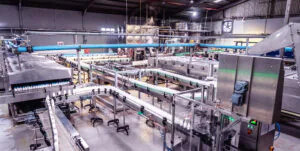Introduction
The healthcare sector plays a vital role in safeguarding public health. However, this crucial function comes at a cost – a significant environmental cost associated with medical plastic waste. Hazardous medical plastic wastes coming from products like syringes and IV bags have been a big threat to environmental cover, facing the imperative healthcare industry to public health. According to a study, over 2 million tons of plastic wastes produced by the health sector annually in the United States contribute to landfill overflows, hazardous chemical leaks, growing microplastics, and increasing greenhouse gas emissions. This is a huge amount of waste, much of which points to the dire need for sustainable practices. Healthcare systems struggle to balance patient care with environmental care, and there is an essential place for innovative approaches and modern technologies in the reduction and management of wastes to lessen the environmental impact and secure a sustainable future.
Sustainability in Healthcare: Need of the Hour
Sustainability in healthcare is important for the environment and future generations. With these ever-increasing, otherwise non-biodegradable medical plastic wastes, there must be a measure taken that would help solve their environmental impacts like landfill overflow, microplastic pollution, and climate change.
The Critical Need for Sustainability in Healthcare
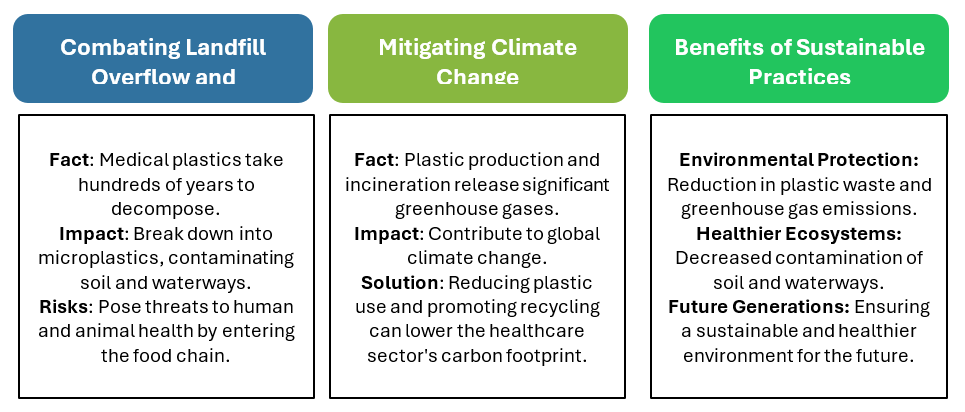
Landfill Overflow and Microplastic Pollution—Combatting the Menace
Most medical plastic wastes do end up in landfills, which take several hundred years to decompose. With time, these plastics degrade to microplastics, which find their way to the soil and water bodies, hence displacing the habitats and probably finding their way into the food chain. This is very dangerous to the health of animals and human beings. Adoption of sustainable activities in healthcare facilities will help reduce plastic wastes and, consequently, reduce the burden in landfills, partly reducing the proliferation of microplastics.
Climate Change Mitigation
Plastic production and burning, greenhouse gases, such as carbon dioxide, have contributed to global climate change. Reductions in plastic use, coupled with increased efforts toward recycling, will help the healthcare industry greatly lessen its overall carbon footprint. Doing so helps reduce the immediate problem of waste but also contributes to other environmental goals by lessening GHG emissions.
Thus, the impetus behind any healthcare shift to sustainability will arise from the growing realization that the traditional handling of waste is no longer viable. More sustainable practices will not only putatively improve environmental outcomes but also result in improving human health and longevity.
Sustainable Practices
It isn’t just about following the flavor of the month; sustainability in health must be. In fact, medical plastic waste can range from landfills overflowing with waste to microplastics contaminating its water and earth through to driving climate change. Here’s the good news: healthcare facilities can make a difference by adopting sustainable practices.
Simple actions, such as reduced plastic use, increased recycling, and new approaches to handling waste, can lessen these environmental impacts. That includes recognizing the fact that old ways of dealing with waste just aren’t working anymore. But by moving to more sustainable practices, healthcare facilities can help to safeguard better environmental outcomes and a healthful future for all concerned. This, ultimately, is not about managing waste better. It is all about making a commitment to Earth and our future generations. Health care systems are evolving with every passing day; sustainability will have to be woven right into their operations. This commitment shall protect the environment and leave a healthier world for those who shall come after us.
Alarming Scale of Medical Plastic Waste
The medical plastic waste problem is huge and far-reaching, as recent statistics and studies show.
Staggering Generation Rates:
A report by Plastic Pollution Coalition states that US healthcare facilities alone generate 2 million tons of plastic waste every year. This highlights the extensive use of plastic in healthcare, mainly due to single-use items for hygiene and patient safety.
Global Problem, Local Impact:
The medical plastic waste problem is not limited to the US. A case study by Greening Healthcare Canada reveals that one Canadian hospital generates over 600 kg of plastic waste daily from single-use items like syringes, gloves, and packaging. These numbers underscore the widespread nature of the problem in healthcare facilities worldwide.
Environmental and Health Risks
Improper disposal of medical plastic waste poses significant health risks. The World Health Organization (WHO) reports that open burning and incineration of healthcare waste can release dioxins, furans, and particulate matter, which are harmful to the environment and human health. The breakdown of plastics into microplastics can contaminate soil and water, entering the food chain and affecting both human and animal health.

Health Hazards of Improperly Disposed Medical Plastic Waste
Improper disposal of medical plastic waste will expose us to serious health hazards embraced by harmful chemicals and infectious diseases.
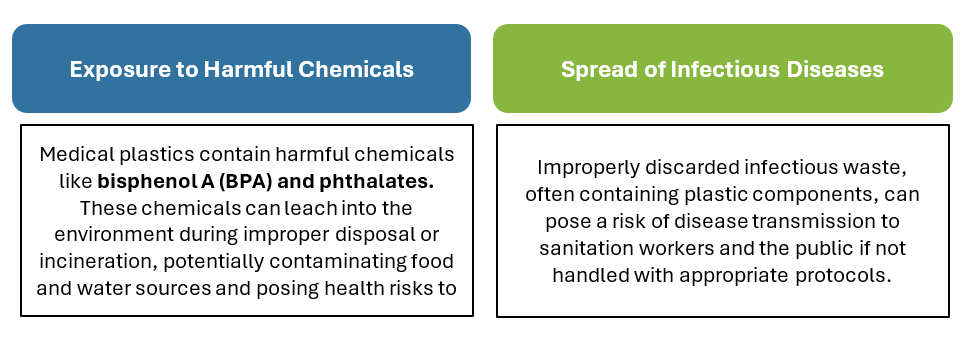
Sanitation Workers: In a study published in the Journal of Occupational and Environmental Medicine, it was reported that unsatisfactorily managed or disposed-of medical waste is a rich source of high additional risk for infectious diseases for handlers.
Public Health: According to WHO, poor segregation and disposal of infectious medical waste are the causes of public health hazards, thereby leading to infections caused by used needles and sharps, which can cause hepatitis B, hepatitis C, and HIV infections.
Health institutions can reduce such risks of health by using strict protocols for waste management and ensure safety in disposing of plastics that will be used in the medical field.
Challenges of Medical Plastic Waste Recycling
The recycling of plastics arising from medical wastes has special challenges to the effectiveness of the management of wastes and environmental sustainability. Most medical plastics have been exposed to body fluids, pharmaceuticals, and other dangerous substances, which entail a significant biohazard risk when such material is to be subjected to recycling. Blood, chemicals, and other hazardous substances are present, thus making it complicated and dangerous to recycle such materials. Additionally, there is high-level mixing of medical waste streams with others, making separation and sorting of recyclable plastics difficult. This can include paper, glass, and organic wastes that make it hard to isolate plastics for recycling efficiently. In that view, NIH has observed that this contamination and mixing problems are significant issues for effective recycling.
The laws and regulations governing medical waste disposal are often complex and do not place much emphasis on the recycling of medical plastics. Different regions have different regulations, which can make it somewhat challenging to establish specific programs with uniformity in areas of operation. The ambiguity in regulation takes away much of the incentive from healthcare facilities to institute thorough programs for recycling.
The Global Waste Management Outlook 2024 says, “Regulatory framework needs to be attuned to the requirement of better and more efficient recycling.”
This means that economic and logistical barriers are very important. For many healthcare facilities, setting up and maintaining a medical plastic recycling program comes with a large initial cost. Moreover, according to the Environmental Protection Agency, collection, transportation, and processing of the medical plastic safely and efficiently add to more layers of logistically complicated and relatively costly steps.
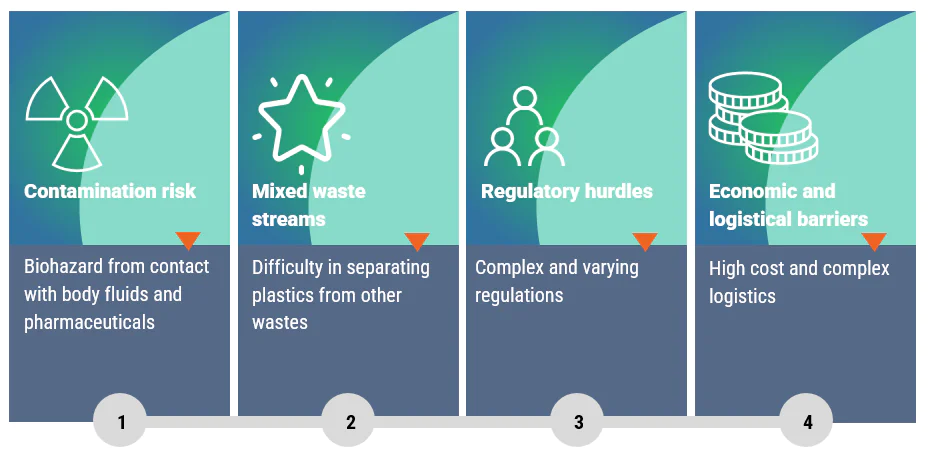
Innovative Technologies for Advanced Medical Plastic Recycling
New advanced technologies applicable to the medical plastic recycling challenge are under development, with very promising results for the improvement of efficiency and sustainability of the recycling process.

Enabling these sophisticated technologies can significantly reduce the ecological impact of medical plastic waste and realize a far more sustainable future for healthcare through responsible disposal.
Future of Medical Plastic Recycling: Scaling Up and Forwards
The war on medical plastic waste is a multi-faceted and sophisticated battle that needs to be waged utilizing all the latest technologies available, along with collective actions and implementation strategies. This section looks at the future of medical plastic recycling by discussing some case studies that exemplify success in medical plastic recycling, strategies to scale up programs, and some potential innovations.
Strategies for Implementing and Scaling Up Medical Plastic Recycling Programs:
Scaling up successful medical plastic recycling programs requires a well-defined strategy that addresses logistical and operational challenges. Here are some key strategies to consider:
- Conducting Waste Audits: Before implementing a recycling program, healthcare facilities should conduct thorough waste audits to identify the types and quantities of plastic waste generated. This data will inform program design and resource allocation.
- Investing in Infrastructure and Training: Upgrading infrastructure with dedicated sorting stations and staff training on proper waste segregation and handling protocols are crucial for successful program implementation. Training should also emphasize safety protocols for handling potentially contaminated medical plastics.
- Collaboration with Waste Management Companies: Partnering with experienced waste management companies specializing in medical waste recycling ensures proper handling and processing of medical plastics. These companies can provide guidance on sorting protocols, transportation logistics, and cost-effective solutions.
- Advocacy and Awareness Campaigns: Raising awareness among staff, patients, and the public about the importance of medical plastic recycling is essential. Educational campaigns can promote responsible waste disposal practices and garner support for the program.
The Future: How Further Innovations Will Make It Happen for Medical Plastic Recycling
Coupled with the existing technologies was the outlook in terms of pipeline developments, which will enhance the potential of recycling medical plastics:
Biodegradable Medical Plastics: Research is going on in coming out with biodegradable medical plastics whose origin is from renewable resources. This source reduction strategy tends to care for plastic waste generation at the source and hence can be a potentially game-changing solution. For instance, BASF is developing biodegradable and biocompatible polymers that will be applied in medical devices and packaging.
AI-Powered Sorting Systems: AI-powered sorting systems can bring a sea change in waste sorting by offering rapid, more accurate identification and separation of recycled medical plastics from mixed streams. This primarily reduces human error and enhances the efficiency of recycling processes.
There is an ever-emerging need to take collective actions on the part of healthcare facilities, recycling companies, policymakers, and public support to tackle this ever-emerging issue of medical plastic wastes. Advanced recycling technologies clearly outlined programs for recycling, and innovation are some of the ways to achieve a more sustainable healthcare system. The future of healthcare lies in the perfect blend of technological advancement with sensitivity toward the environment. This can be achieved by focusing on responsible management of waste and innovative solutions for the same, so that the progress of health does not have to be paid for at the cost of planetary health.
Thereby, facilities that have engaged in sustainability programs reached an estimated cost savings of $68 million during 2018 through waste and energy reduction alone. Such efforts do not only benefit the environment but provide tangible financial incentives to healthcare facilities toward staying more sustainable in their operations.
Case Studies: Beacons of Success in Medical Plastic Recycling
The road toward a more sustainable future has already started. Several hospitals and healthcare facilities are initiating successful programs for medical plastics recycling and paving the way.
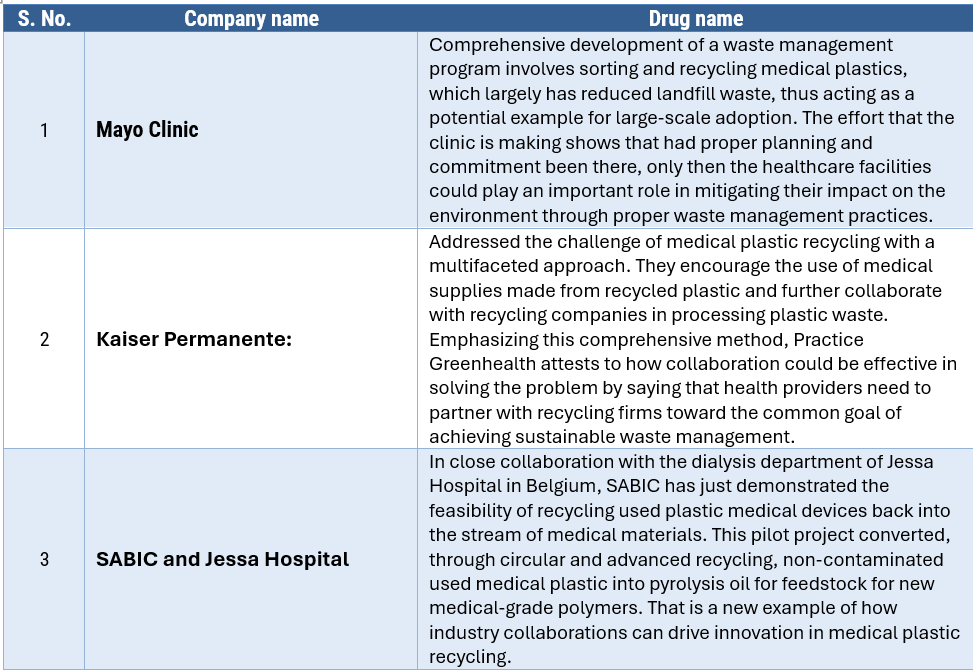
These case studies illustrate the feasibility and success of medical plastics recycling programs. Taking cue from these experiences and applying their models—appropriately tailored to individual locations—healthcare facilities across the world can make huge contributions toward a more sustainable future.




